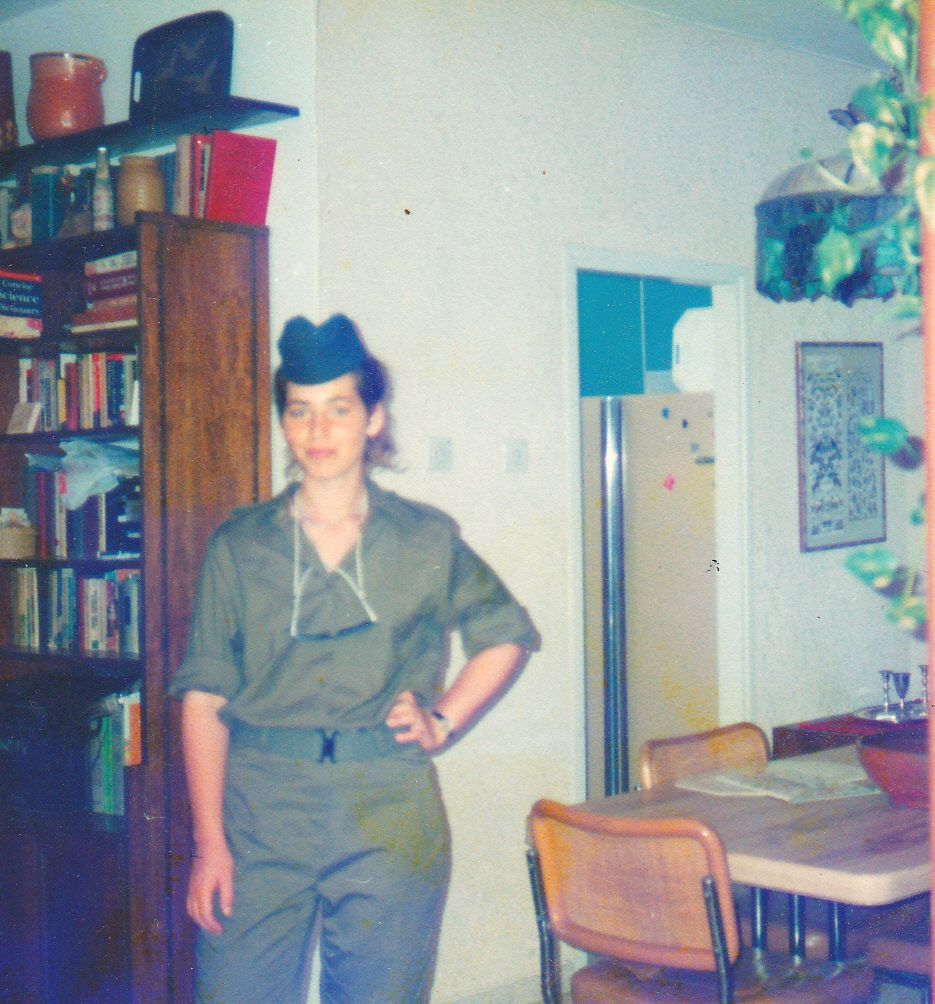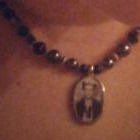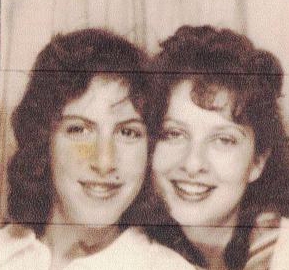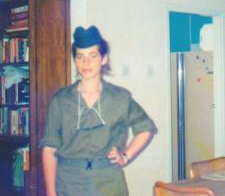August 15, 1990
I am on my way to Julis. I unclench and wipe sweaty palms on my thighs, drawing identical paths of dark blue onto the fabric of my jeans. The window to my right has been reflecting quiet stretches of desolation for half an hour now, so I close my eyes and focus on the blessedly cool air that rushes toward me from the vents above my head. This passing scenery remains, the last remnant of the everyday world that I was counting on, but it no longer seems real. I thought I had come to terms with this, but apparently there was no way to know what it would feel like, once the sands of eventuality trickled down to now.
I have been drafted into the Israeli Defense Forces and am currently being hauled off to nebulous whereabouts. I know only that it is called Camp Julis – a location typed onto the orders I received in the mail many months ago. I began dreading its arrival after some classmates with earlier birthdates received theirs. Still, when I got home from school one day to find it, an interloper among the bills, masquerading as any other envelope, I was shocked. I went upstairs to our apartment and called my mom to let her know that my existence would not escape notice after all, as I had so naively prayed it would.
Now I am on my way to become a soldier in the army of a country I was only visiting. My family landed here seven years ago after my mother decided that our comfortable suburban Detroit existence had become a canvas no longer worth painting. She’d announced it one day when I was ten years old after sitting us all down for a conversation that would alter the course of everything.
“When I was eighteen I joined a group that was going to help build Israel,” she began, recounting a narrative my brothers and I had heard countless times before. We looked at each other and rolled our eyes, figuring that she was preparing us for another one of her trips to Israel that left us with hired nannies and disruption for weeks. We each got into position, readying ourselves for combat.
“Hold on,” she cautioned, irritation invading her tone. With her mouth pulled taut, she shot us each a glare that effectively silenced our burgeoning protestations. “I’m not leaving you guys.” Oh good, I thought.
“I put the house up for sale,” she blurted out, “and we’re moving to Israel next summer.” The noise from my oldest brother became an immediate deafening roar that ended all rational discussion of the matter, so I went upstairs and lay down on my big-girl bed in my pretty yellow bedroom. I hadn’t been to Israel since I was two years old. I couldn’t even begin to think about what it would be like there. All I knew was that I wasn’t going to start middle school next year with all my friends after all.
Eight years have passed since that moment; I suppose some would say that I live here now. The government certainly agrees, and my new citizenship papers indicate that I am no longer a provisional member of this society. I have thus far attempted to pose as a permanent innocent bystander to the unfolding events of my life here, but have now unwittingly become a part of the proceedings.
I had no intention of being drafted, and my mother knew I had always planned to take off as soon as I was of age. And yet, we had never really discussed it much. But now that inevitability had found me, it was a subject we could no longer avoid. I revealed my intentions to skedaddle after graduation in a brief exchange during dinner one night shortly after receiving the draft notice. The news had been suspiciously met with little more than a raised eyebrow. I had been expecting more of a reaction.
“And how exactly are you going to get out of the country?” my mother had calmly ventured a few days later as she performed a delicate operation upon a tomato.
“I just have to present a roundtrip ticket that returns before that date right there.” I theatrically pointed to the paper tacked to the fridge indicating my August deadline. “I simply won’t be using the return part.”
“You know what I would give for the opportunity to do this?” she inquired, lopping off one end of a large cucumber, which fell onto the board creating a culinary exclamation point. “And you won’t be able to come back. You know that, right?” she countered, testing my fortitude.
“Someone told me they’d arrest me at the airport, but only if I come back within ten years.” I was feeling confident. I had answers.
A few moments passed where the only sound was her knife against the cutting board. I was beginning to think that maybe I had won this round. Then, before I could raise my defenses, she quietly asked another question.
“And what if I get sick or something?”
I hadn’t thought of that….
I had a few close friends who knew of my intentions. I’d met Dalia my first week in the country. Her family had come from Uruguay six months before we’d immigrated, or “made Aliyah”, as they call it here – a reference to the essential Zionist concept of returning to the Jewish homeland.
Like most new immigrants, my family and hers had gone straight from the airport to live in dreary government housing where the rent was free for the first six months – a gift to entice Jewish people living in the diaspora to return “home.” Dalia and a few other residents around my age had come knocking on my apartment door to introduce themselves. We hadn’t really liked each other at first, mostly because of a language barrier, but we would become close friends.
We sat next to each other in class every year until graduation, passing notes under the desk, cheating off each other’s tests, or skipping class altogether to sneak back to my empty apartment and watch movies. I wouldn’t say that she was looking forward to her service, but Dalia hadn’t retained the same longing for South America that I still harbored for its northern cousin. She had come to see herself as an Israeli years ago.
“You have to do it. We all have to; it’s our obligation,” she intoned in her nearly flawless Hebrew accent. In contrast, my lumbering pronunciation always exposed me for the imposter I felt I was.
Hers was an unoriginal argument demonstrated to us in one way or another every day: soldiers casually making their way to the bus stop in the morning; festivities for those who would be off to serve or who had finally finished serving; a school outing to a military base in eleventh grade, leading to a weekend of gun training the following year to get us comfortable with the concept of bearing arms. I had managed to dodge that last adventure by convincing my doctor at the last minute that I was unwell. I saw no reason why I should learn how to shoot when I would be safely out the exit door instead.
“It was my mother’s choice to come here, not mine. I owe this country nothing,” I’d responded. I didn’t care how selfish that sounded. I had no plans to stay, and I felt no allegiance. It was Dalia’s problem if she had fallen for it all.
And then my mother’s friends had started in on me. In truth, their numbers were small, because much of the English-speaking community in Israel is religious. My mom and I liked bacon and watching movies on Saturday afternoons, but not having a kosher kitchen meant that most dinner invitations could not be reciprocated in our home, and sharing a meal is what adults do together. Those first years were difficult for her. Lonely. Nevertheless, I found myself having to deal with Francine, an elegant Parisian woman my mother had befriended in a Hebrew language class in the small town of Rehovot I was forced to call home.
“You will be leaving your moder? She will be solitaire, no?” she whispered in her pleasant French patois one evening at our apartment while my mom was on the phone in the other room. It was an angle I had already considered, but no one had voiced it until then, and it was a compelling argument. I had an image of my mother withering the years away in her favorite chair with only the cover of her book changing scenery. And Francine was a widow like my mom, a single mother with a son in the army. I was being worn down.
A few months later, I capitulated. I negotiated a trip back to the States after high school graduation. My mother also agreed to pay for driving lessons to get an Israeli license – a costly concession, but she wanted me to do my service, and I was attaching a price to that. I was her last hope that at least one of her children would go into the Israeli Defense Forces the way she had always insisted she wishes she could have done.
But mostly, I had come to the humbling realization that I was intimidated by the prospect of actually going through with my plan to flee. Although I had visited a few times since our move, I hadn’t lived in the United States since I was eleven years old. Just out of high school, I would be completely on my own. I wasn’t close to my family – not even to my own siblings, since an ocean had divided us far too long. My two older brothers had eventually badgered my mother into sending them back before the government forced citizenship upon them. They each left – one for boarding school back in Michigan and the other to a distant cousin’s in upstate New York – before they had even graduated high school. Unlike me, they had escaped their deadlines. Once we had accumulated seven years of residency here, we had reached the end of the line, and the government bestowed citizenship upon me whether I wanted it or not.
Maybe it wouldn’t be so bad, I began to rationalize. Two years wasn’t really all that long in the scheme of things. And yet so much would change. I’d seen kids graduate high school and metamorphose from kids into soldiers and then into responsible adults all the time. Over the period of their service, they often become unrecognizable from those children you knew before.
I remember sitting in class one day at the beginning of my final year of high school when a soldier in shiny new fatigues poked his head in. A girl shrieked and ran to embrace him. It was then that I recognized her boyfriend. I was dumbstruck; it had only been a few months since he’d graduated, but that scrawny bespectacled boy had transformed into a man. He had a rifle casually slung over one shoulder as her arm draped the other, and off they went leaving the muffled nattering of my classmates behind. It was okay with our teacher – the boyfriend had just completed basic training, after all.
And now I too am about to become unrecognizable by somehow having managed to become one of them. Officially so. I don't just feel like I’ve been inducted into the army, but also really and ultimately, forcefully and painfully, metamorphosed into a club member of the entire Israeli culture itself. As I’ve risen through the ranks over the years – learning the language, making the friends, receiving the education, acquiring the documents – I’ve been drifting along, remaining foreign, forever an outsider. I don’t belong here. At the same time, I don’t feel like I quite belong to anywhere anymore.
We arrived to meet the bus that would take me to Julis, and at not even eight o’clock the sun was already an unforgiving nemesis burning our eyes and moistening our clothes. Dalia had spent the drive trying to make light of it all with snarky comments about this or that, but now she stood soberly just taking it all in. Her own deadline was only months away. I got onto the bus, found an empty seat and stuck my head out the window.
“You’ll be fine,” my mother yelled up to me. She’d been saying that ever since I agreed to do this, but she really had no idea any more than I did and her hollow reassurances from her position out there were particularly annoying this morning.
I pulled my head back inside and discovered dozens of eyes investigating me. When I looked to the front, the face of an irritated-looking army representative stared down at me from above a clipboard flattening her formidable chest. I sank to my seat, defeated. The exit was blocked now by this strange new being, and to top it all off with a big red bow I had singled myself out as a loud American idiot, my inane last promise of "I'll call you in a few days" still echoing around the vast chamber of the bus.
I sat back and listened to her brief statement that concluded with something along the lines of "you will be provided with more information later." She then read off our names from the roster in her hands. When she got to mine, I hesitated for the briefest of moments and then decided that it was best to continue the charade and play along for now.
I raise my hand and admit it. I am present. I showed up. Do with me what you will, and then let me go. Satisfied that all were accounted for, she unceremoniously exited the bus, which was an act the rest of us were no longer permitted to do.
I turn one last civilian eye towards my mother who is still standing out there, observing, with some elusive and indecipherable expression on her face. I have known her the length of my entire existence and yet continue to be amazed at the mastery with which she manipulates her features. At first glance, they might appear unchanged and even indifferent, but then a subtle shift might indicate displeasure to such a degree that I am forced to react. Today, however, she displayed nothing I could decipher.
Would she really do this if she could, as she claims? She was supposed to come here when she was my age with a youth group of disillusioned and also wide-eyed Americans who’d intended to pioneer their way to a socialist utopia, but a case of mono made her literally miss the boat, stay behind, meet my father, marry, and procreate.
As I bathe in perspiration, a nervous tic begins wrestling with the folds of my right eye. I watch her watch me and wonder if my mother is experiencing any regret-concern-guilt-sympathy-fear-doubt-remorse-apprehension about what is happening to her only daughter, her only child to actually fully face the consequences of her transatlantic transaction.
I finally decide to seal my eyes against her and everything else and simply pray that she appreciates my sacrifices and will consider them every moment of every day for the rest of her natural life. Suddenly, my chariot roars to life. I look outside once more as the passing scenery hastens to transform my mother and everything else into blurry shapes in the distance. I take two fingers and try to squish her form between them, but the mom-shape is already moving away, presumably towards the car-shape.
Ruthy Hope Slatis has been an English and Hebrew language educator for over sixteen years. She holds a BA in English Literature from California State University, Northridge, where she also obtained her teaching credential. Her love of travel recently led her to the Czech Republic where she earned a TEFL certificate in 2015. This essay is an excerpt from her unpublished novel, Dead Sea Rising, which is part memoir and part metafictional account of this author’s circuitous journey through life, despite the powerful allure of inertia. She currently resides north of Boston.






